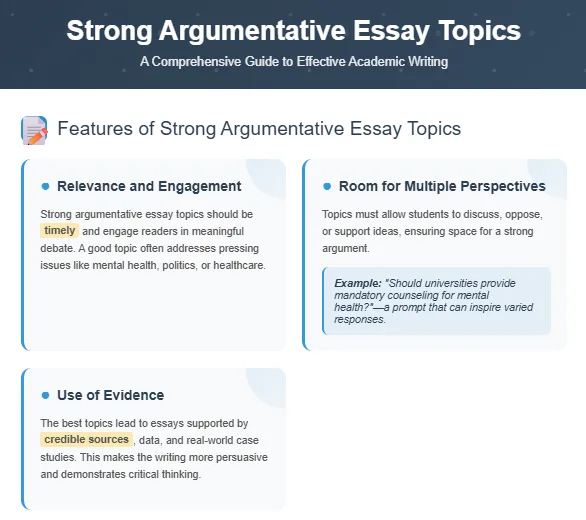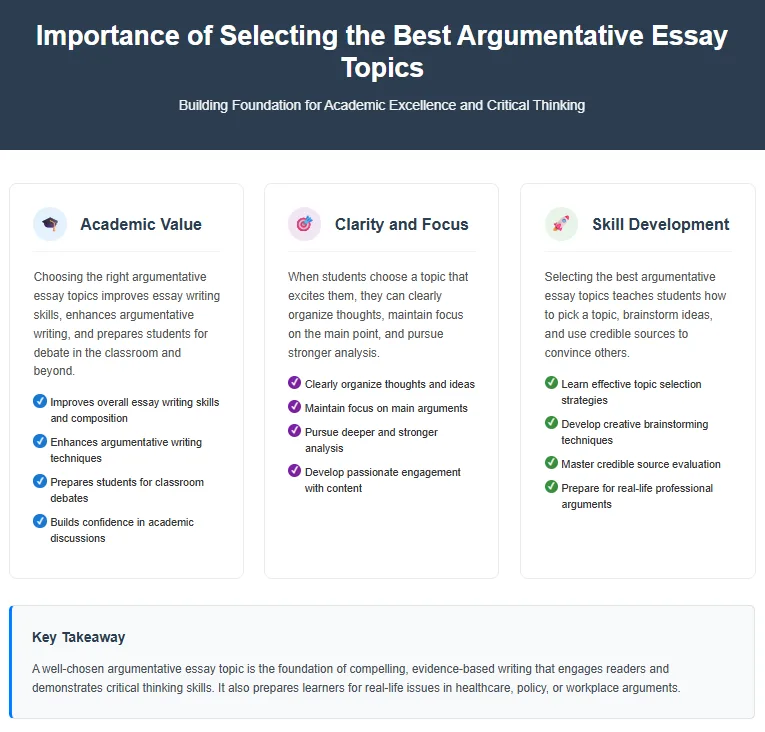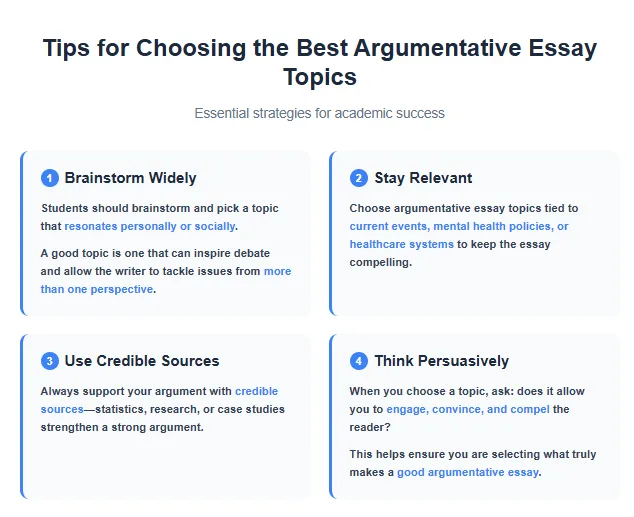What is an Argumentative Essay?
- Definition:
- An argumentative essay is a form of argumentative writing where students craft a clear thesis and provide evidence to support their main point.
- The goal is not just to present facts but to convince and sometimes compel readers to see a new perspective or themes based on the literature work.
- Purpose in Education:
- In university or classroom settings, argumentative essays train students to analyze case studies, build a strong argument, and discuss different viewpoints.
- They encourage learners to tackle issues such as mental health, healthcare, or social justice through reasoned debate.
- Difference from a Persuasive Essay:
- While both aim to persuade, a persuasive essay often relies more on emotion, while an argumentative essay depends on credible sources and evidence to oppose or support an argument.
Features of Strong Argumentative Essay Topics
- Relevance and Engagement:
- Strong argumentative essay topics should be timely and engage readers in meaningful debate.
- A good topic often addresses pressing issues like mental health, politics, or healthcare.
- Room for Multiple Perspectives:
- Topics must allow students to discuss, oppose, or support ideas, ensuring space for a strong argument.
- Example: “Should universities provide mandatory counseling for mental health?”—a prompt that can inspire varied responses.
- Use of Evidence:
- The best topics lead to essays supported by credible sources, data, and real-world case studies.
- This makes the writing more persuasive and demonstrates critical thinking.

Importance of Selecting the Best Argumentative Essay Topics
- Academic Value:
- Choosing the right argumentative essay topics improves essay writing skills, enhances argumentative writing, and prepares students for debate in the classroom and beyond.
- Clarity and Focus:
- When students choose a topic that excites them, they can clearly organize thoughts, maintain focus on the main point, and pursue stronger analysis.
- Skill Development:
- Selecting the best argumentative essay topics teaches students how to pick a topic, brainstorm ideas, and use credible sources to convince others.
- It also prepares learners for real-life issues in healthcare, policy, or workplace argument.
- Once you’ve chosen a topic, check out our argumentative essay examples to see how strong arguments are structured in practice.

Tips for Choosing the Best Argumentative Essay Topics
- Brainstorm Widely:
- Students should brainstorm and pick a topic that resonates personally or socially.
- A good topic is one that can inspire debate and allow the writer to tackle issues from more than one perspective.
- Stay Relevant:
- Choose argumentative essay topics tied to current events, mental health policies, or healthcare systems to keep the essay compelling.
- Use Credible Sources:
- Always support your argument with credible sources—statistics, research, or case studies strengthen a strong argument.
- Think Persuasively:
- When you choose a topic, ask: does it allow you to engage, convince, and compel the reader?
- This helps ensure you are selecting what truly makes a good argumentative essay.
- For a wider perspective, learn how chosen topics can be developed into structured thematic essays that capture major themes.

Top Categories of Argumentative Essay Topics for Students
Education and Campus Life
- Should college education be free for all students?
- Is online learning as effective as traditional classroom education?
- Is student debt destroying the value of higher education?
- Do standardized tests accurately measure student ability?
- Should grading systems be abolished in universities?
- Do college rankings harm educational equality?
- Should attendance be mandatory in university lectures?
- Should campus security prioritize safety over student privacy?
- Do college sports programs exploit student-athletes?
- Should group projects be replaced with individual assessments?
- Does technology in the classroom enhance or hinder learning?
- Should universities require courses on ethics and diversity?
Beyond debates, you may also explore clear and factual expository essay topics for building strong informative essays.
Government and Politics
- Should voting be mandatory in democratic nations?
- Is government surveillance justified for national security?
- Should term limits be imposed on members of Congress?
- Is gerrymandering the greatest threat to fair elections?
- Should political campaigns be publicly funded?
- Is democracy the best form of government for all countries?
- Should there be stricter regulations on political lobbying?
- Do international sanctions do more harm than good?
- Should age limits be placed on political leaders?
- Is federalism more effective than centralized government?
- Should governments censor extremist speech online?
- Do global organizations like the UN still hold real power?
If you’re interested in capturing detail instead of debate, try exploring our engaging list of descriptive essay topics.
Social Issues and Ethics
- Should the death penalty be abolished worldwide?
- Is cancel culture promoting accountability or mob justice?
- Should countries open borders to more refugees?
- Is animal testing ethical in scientific research?
- Should assisted suicide be legalized?
- Should children’s social media use be legally restricted?
- Is income inequality the root of most social problems?
- Should adoption agencies allow single parents to adopt?
- Is genetic engineering of humans morally acceptable?
- Is it ethical to use artificial intelligence in hiring?
- Should companies be held responsible for worker exploitation abroad?
- Is freedom of speech absolute or should it have limits?
Looking for personal storytelling instead of structured debate? Explore our collection of narrative essay topics.
Essay Services
Expert support for every stage of essay.
- Assistance with topic selection
- Step-by-step essay writing help
- Editing, proofreading, and formatting help
Free Consultation
Talk to our essay experts before you begin.
- One-on-one discussion of your essay
- Guidance on essay structure and citations
- Tailored advice to your course guidelines
Science, Health, and Technology
- Should gene editing like CRISPR be allowed for disease prevention?
- Is artificial intelligence a threat to human jobs?
- Should vaccines be mandatory for all citizens?
- Should human cloning ever be legalized?
- Do smartphones negatively affect mental health?
- Should governments regulate social media algorithms?
- Is space exploration worth the cost?
- Do fitness trackers actually improve health outcomes?
- Should humans colonize Mars?
- Is virtual reality beneficial in education?
- Should organ donation be opt-out instead of opt-in?
- Is nuclear energy a sustainable alternative to fossil fuels?
Not sure how to develop your chosen subject? Review our expository essay examples to see how ideas are explained with clarity
Media and Communication
- Is fake news the biggest threat to democracy?
- Should influencers be legally required to disclose sponsorships?
- Should social media platforms ban political advertising?
- Should celebrities be considered role models?
- Do violent video games promote aggression?
- Should the government regulate freedom of the press?
- Is traditional journalism dying in the digital age?
- Do movies and TV shows glamorize violence?
- Should public figures have less right to privacy?
- Is reality television harmful to society?
- Do streaming platforms harm cinema culture?
- Should the media prioritize positive news coverage?
Environment and Sustainability
- Is climate change the greatest threat to humanity?
- Should single-use plastics be banned worldwide?
- Are electric cars truly sustainable?
- Should governments invest more in renewable energy?
- Should deforestation be punished as a global crime?
- Is nuclear power a solution to climate change?
- Should people be forced to recycle?
- Do developed nations bear more responsibility for global warming?
- Should GMOs be banned in food production?
- Is fast fashion destroying the environment?
- Should hunting endangered species be a criminal offense?
- Can eco-tourism harm more than it helps?
Law and Criminal Justice
- Should prisons focus more on rehabilitation than punishment?
- Should drug use be decriminalized?
- Should there be stricter laws on gun ownership?
- Should juvenile offenders be tried as adults?
- Is capital punishment effective in deterring crime?
- Is racial profiling justifiable in policing?
- Do private prisons create injustice in society?
- Should the legal drinking age be lowered?
- Are international war tribunals effective?
- Should hate speech be classified as a crime?
- Is plea bargaining fair in the justice system?
- Are three-strike laws unjust?
Sports and Physical Education
- Should college athletes be paid?
- Should female athletes receive equal pay to male athletes?
- Should performance-enhancing drugs be legalized in sports?
- Do professional athletes serve as good role models?
- Is eSports a real sport?
- Should physical education be mandatory in schools?
- Do sports encourage violence among fans?
- Is youth sports too competitive today?
- Should contact sports like boxing be banned?
- Do the Olympics benefit the host country?
- Should student-athletes be prioritized over academics?
- Is cheerleading a sport?
Arts, Literature, and Culture
- Should controversial books be banned in schools?
- Is cultural appropriation ever acceptable?
- Should public funds support the arts?
- Should art be censored for offensive content?
- Do museums preserve culture or exploit it?
- Should schools make literature classics mandatory?
- Is digital art as valuable as traditional art?
- Does modern music influence social behavior negatively?
- Does Hollywood misrepresent minority cultures?
- Should graffiti be considered art?
- Are awards like the Grammys and Oscars biased?
- Should literature focus more on diversity and inclusion?
Family and Relationships
- Should same-sex couples have equal adoption rights?
- Is marriage becoming outdated?
- Should parents monitor their children’s online activity?
- Do long-distance relationships work in modern society?
- Should divorce laws be more restrictive?
- Are traditional gender roles harmful to families?
- Should surrogacy be legalized worldwide?
- Is cohabitation better than marriage?
- Should parents be held legally responsible for children’s crimes?
- Does social media harm family relationships?
- Should arranged marriages still be practiced?
- Is having children a societal expectation?
Business, Economics, and Workplaces
- Should the minimum wage be increased?
- Should the four-day workweek be implemented?
- Do multinational companies exploit developing nations?
- Is remote work more productive than office work?
- Should corporations be taxed more heavily?
- Is capitalism the best economic system?
- Should businesses prioritize profits over ethics?
- Does outsourcing harm local economies?
- Is consumerism destroying the planet?
- Should CEOs earn more than 100 times the average worker?
- Do unions still matter in the modern workplace?
- Should gig workers receive employee benefits?
Religion and Philosophy
- Should religion influence laws in secular countries?
- Do moral values depend on religion?
- Is religion compatible with science?
- Is atheism on the rise globally?
- Should religious symbols be banned in public schools?
- Is euthanasia compatible with religious teachings?
- Should governments fund religious institutions?
- Is philosophy more important than religion in education?
- Should freedom of religion include freedom from religion?
- Do interfaith marriages promote tolerance?
- Should schools teach philosophy to children?
- Does prayer belong in public schools?
History and Global Affairs
- Should colonial powers pay reparations?
- Should historical monuments linked to slavery be removed?
- Is nationalism a danger in global politics?
- Was World War II avoidable?
- Did the Cold War benefit technological progress?
- Is globalization erasing cultural identities?
- Did the Industrial Revolution improve lives overall?
- Should the United States intervene in foreign conflicts?
- Was the League of Nations a failure?
- Is history taught from a biased perspective?
- Should historical figures with controversial views be “canceled”?
- Did the fall of the Soviet Union benefit the world?
Digital Innovation and Artificial Intelligence
- Should schools ban ChatGPT and AI tools?
- Should deepfake technology be banned?
- Should AI replace human teachers in classrooms?
- Is cryptocurrency the future of global finance?
- Should governments regulate facial recognition technology?
- Do self-driving cars make roads safer?
- Is AI-generated art real creativity?
- Should humans fear job loss due to automation?
- Are cryptocurrencies harmful to the environment?
- Is AI surveillance a violation of privacy?
- Can AI ever achieve consciousness?
- Is digital currency safer than traditional banking?
Public Health and Medicine
- Should healthcare be considered a human right?
- Is mental health more important than physical health?
- Are pharmaceutical companies too powerful?
- Is universal healthcare the best system?
- Should organ donors be financially compensated?
- Are alternative medicines effective?
- Should governments ban unhealthy foods?
- Is obesity a personal choice or a public health crisis?
- Should vaccinations be required for school entry?
- Should medical research prioritize rare diseases?
- Should euthanasia be legal for terminally ill patients?
- Is telemedicine as effective as in-person care?
Key Takeaways
- Choosing the right argumentative essay topic ideas is the key to writing a compelling paper. A strong topic should spark interest, help students explore their field of study, and be likely to engage readers.
- Every argument essay begins with a clear thesis statement and an outline that guides the paragraph flow, from introduction to body paragraphs and finally the conclusion where you summarize your good argument.
- The most compelling argumentative essay comes from a comprehensive approach: gather information, consider opposing viewpoints, and ensure you have enough credible sources to make your case logical.
- A perfect topic is not just thought-provoking but also practical for your approach to college writing—it allows you to hone critical skills, take a stand, and raise new questions.
- If you are short on time or need professional expertise, academic writing services can support your draft by offering structured guidance, ensuring your arguments remain clear and persuasive.
- Want to see how vivid details can bring ideas to life? Check out our descriptive essay examples for inspiration.
- Stories can also strengthen debates — explore our narrative essay examples to see how personal experiences shape arguments
Sources
- How to Write a Standout Argumentative Essay. Available at: https://www.grammarly.com/blog/academic-writing/argumentative-essay/
- Argumentative Essays: MLA Sample Argumentative Papers. Available at: https://guides.skylinecollege.edu/c.php?g=279231&p=2778200
- Argumentative Writing. Available at: https://writingcenter.uagc.edu/argumentative-writing
